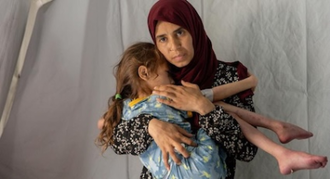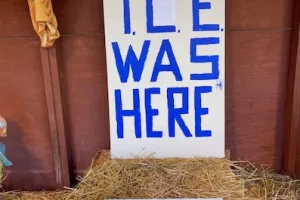UN warns Israeli Gaza offensive could be 'beyond catastrophic'

©WHO A 7-year-old with severe acute malnutrition and dehydration at field hospital in southern Gaza in April amid looming famine in north.
Source: UNOCHA
United Nations officials warned Friday that Israel's planned military takeover of Gaza City could have devastating consequences for civilians across the enclave. The warning comes as Israeli forces ramped up operations on the city's outskirts.
"The impact of a full-blown offensive would be beyond catastrophic - not only for those in the city but for the entire Gaza Strip," the UN Office for the Coordination of Humanitarian Affairs said in a statement, noting that several neighbourhoods have already come under deadly attack in recent days.
UN Secretary-General Antonio Guterres described the escalation as a "new and dangerous phase," telling reporters that hundreds of thousands of civilians - already displaced, exhausted and traumatised - could be forced to flee again, deepening the humanitarian crisis.
Israeli forces have begun the initial stages of the offensive, operating with what military officials described as "great intensity" around Gaza City.
In a video message, a military spokesperson said strikes would intensify and vowed that operations would continue until all hostages were recovered and Hamas was dismantled.
On Friday, the Israel Defence Forces announced the cancellation of the daily 10-hour humanitarian pause in Gaza City, declaring the area a "dangerous combat zone."
The pause, which ran from 10am to 8pm, had been in place since July 27 and was coordinated with the UN and international aid groups to allow humanitarian access to Gaza City, Al Mawasi and Deir al-Balah.
Despite mounting international concern, Israel has pressed ahead with plans to seize Gaza City, following weeks of heavy bombardment and artillery fire. The city, home to hundreds of thousands of civilians, is considered Hamas's last major stronghold.
Priests and Sisters in the Catholic and Greek Orthodox parishes have said they intend to stay, to look after the sick and elderly people sheltering with them, who are unable to move.
Amid reports of increased Israeli military operations across Gaza City on Friday, UN aid agencies repeated urgent warnings of ongoing famine and a likely rise in preventable disease, linked to the dire living conditions in the war-shattered enclave.
"We are on a descent into a massive famine," said Jens Laerke, spokesperson for the UN aid coordination office, OCHA, "and we need massive amounts of food getting into the Strip and safely distribute it across the Gaza Strip".
Referring to the latest catastrophic assessment of food insecurity in Gaza from the UN-backed IPC group of experts, Mr Laerke noted that 500,000 people are in the worst possible situation today, with another 160,000 expected to be added to that number in the coming weeks.
"They all need food," he told journalists in Geneva. "The entire Gaza Strip needs food. There would not have been declared famine had there been sufficient amounts of food."
In a related development, the UN World Health Organization (WHO) highlighted the growing risk of communicable diseases in Gaza, with 94 suspected cases of Guillain-Barré Syndrome now reported.
The disease can cause paralysis and is treatable in hospital with intravenous immunoglobulin or plasma exchange, according to WHO. "But these two treatments are at zero stock, as are anti-inflammatories," said WHO spokesperson Christian Lindmeier, referencing ongoing Israeli aid restrictions impacting humanitarian relief supplies entering Gaza. "These deliveries must be urgently expedited as much as surveillance and testing capabilities."
Between 20 and 26 August, out of 89 attempts to coordinate relief missions with Israeli authorities across Gaza, 53 were facilitated, 23 were initially approved but then impeded on the ground, seven were denied and six had to be withdrawn by the organizers, OCHA said in an update.
The UN later voiced deep concern that the intensifying Israeli offensive on Gaza City could have "an even more horrific impact" on civilians across the Strip.
Spokesperson Stéphane Dujarric said Israel's decision to halt daily tactical pauses in Gaza City - now declared a "dangerous combat zone" - threatens both people's lives and the ability of aid workers to operate.
UN teams reported that while the pauses had suggested some space for humanitarian action, "bombing was still observed in areas and at times where such pauses had been declared." The Office for the Coordination of Humanitarian Affairs (OCHA) stressed that "life-saving aid operations must be enabled, not rolled back".
Mr. Dujarric warned that forcing people further south risked "a recipe for disaster" and could amount to forcible transfer. He said the UN expects its work to be facilitated, reminding parties that civilians and humanitarian facilities "must be protected at all times".
The head of the UN agency for Palestine refugees (UNRWA), Philippe Lazzarini, renewed his urgent call for a ceasefire in Gaza, warning that civilians face death not only from bombardment but also from mass starvation and lack of aid.
"Every hour today counts, the more we wait, the more people will die," the UNRWA Commissioner-General said in interview with UN News's Daniel Johnson.


















